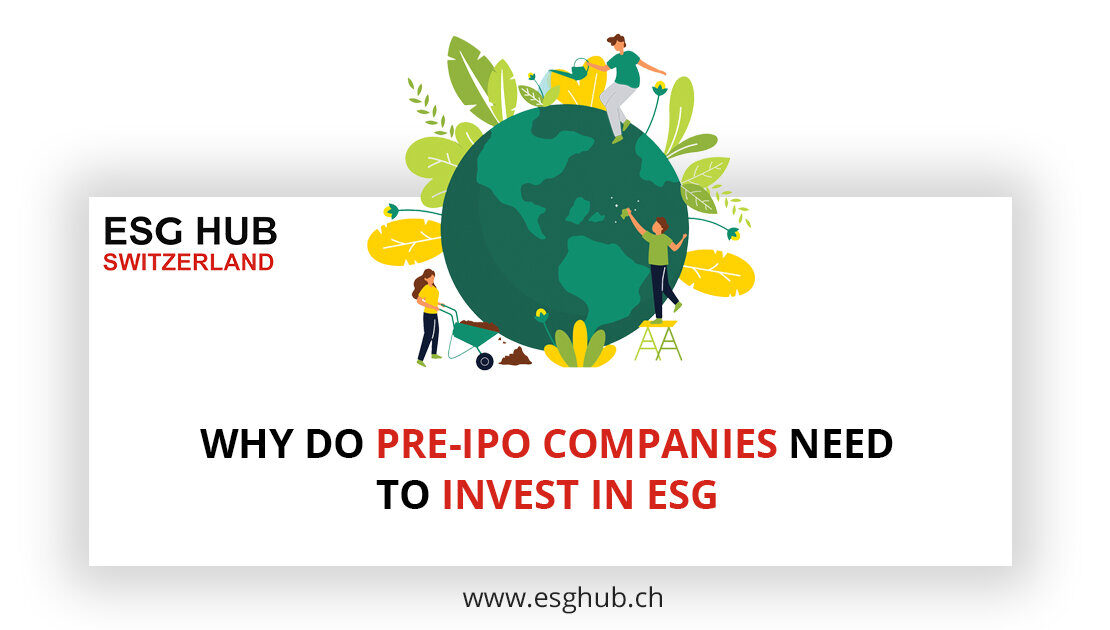Why do pre-IPO companies need to invest in ESG?
Why do pre-IPO companies need to invest in ESG?

“Environmental, social and governance (ESG) strategy is quickly moving from a ‘good’ to a ‘must-have’ strategy for pre-IPO companies preparing to enter the market.”
In recent years, ESG integration in business activities has become a hot topic in the financial market. The volumes of sustainability or ESG investing are increasing rapidly. According to Bloomberg, ESG-focused investments are projected to exceed US $41 trillion by 2022 and US $50 trillion by 2025. As a result, having an ESG strategy is now regarded as an essential strategy for pre-IPO companies preparing to go public.
Pre-IPO companies can issue ESG-related funds, including green bonds, and social impact funds. On the one hand, green corporate bonds help companies become more sustainable as the use of the proceeds, the capital obtained from investors, is spent on green activities. On the other hand, investors are increasingly looking for green companies to invest in. By signalling their sustainability credentials, pre-IPO companies can attract impact investors.
Let’s take a closer at look why pre-IPO companies should invest in ESG.
But first,
What is ESG?
“ESG” stands for “Environmental, Social, and Governance.”
- The environmental criterion addresses the environmental impacts of a business in relation to climate change, biodiversity, water, and other natural resources.
- The social aspect is about how companies interact with their employees and the societies in which they operate. Material issues that affect employees include the company’s policies on gender equity, diversity, inclusion, and its health and safety track record with its own employees and suppliers.
- The governance component is about whether a company manages its business in a responsible and legally compliant manner. Hence, the “G” covers how the company complies with government laws and regulations and how it sets its own policies in relation to business ethics.
When making ESG investment decisions, investors consider a company’s ESG score. These scores are calculated by third-party organisations, often rating companies, and show how a company performs compared to its competitors in the relevant sector. Institutional and private impact investors want to invest in companies with high ESG scores.
Why is ESG needed?
The Covid-19 pandemic and increased focus on climate change have pushed ESG issues to the forefront of investment. Investors are increasingly concerned about the risks of climate change and the social impacts of their investments. Hence, they are putting pressure on corporations to show how they address these concerns. Pressure from consumers and regulators is also increasing. By investing in sustainability, pre-IPO companies can improve their reputation and potentially attract new investors.
Why do pre-IPO companies need to invest in ESG: higher valuation?
Taking a business from private to public is not always a simple task. When a company went public a few years ago, every management department was focused on the financial metrics of that company. Financial metrics significantly influenced investment decisions. Market trends in recent years, however, dictate that investors are paying attention not only to a company’s financial metrics but also its sustainability metrics. Higher ESG scores may imply higher initial valuation.
In the last year, a record US $649 billion was invested in ESG-focused funds, up from US $542 billion and US $285 billion in 2020 and 2019, respectively. Nearly 10% of all global fund assets are now made up of ESG funds. This has encouraged pre-IPO businesses to take ESG factors seriously and incorporate sustainable approaches into their business models and activities.
Here are a few reasons why pre-IPO companies should consider investing in ESG.
1.To improve investor expectations and your sustainability reputation
Investors are becoming increasingly interested in ESG. Its influence on investors was captured in a recent survey in which 325 investors were polled on how ESG influences their decision-making. Almost 80% said ESG was an important factor in their evaluation process, and nearly half said they would avoid companies that did not meet their ESG commitments.
This shows that investors are seriously considering your company’s impact on society and the environment when making investment decisions. Therefore, your company’s ESG approach is crucial to its valuation.
2. To increase employee engagement and retention while strengthening your competitive edge
Consumers and employees are increasingly looking for companies that have long-term positive impacts on the environment and society in which they operate. By incorporating ESG into your business, you will improve the engagement and loyalty of your customers and employees.
3. Regulatory compliance
The global regulatory environment is rapidly changing, and ESG is becoming a mainstream form of regulation.
For instance, the EU’s Sustainable Finance Disclosure Regulation or Switzerland’s Swiss Climate Scores are public initiatives to improve transparency in the market for sustainable investment products and to ensure transparency around businesses’ sustainability claims.
Companies must consider ESG regulations at the pre-IPO stage so that they are prepared for future regulations, which are likely to be increasingly stringent.
Conclusion
ESG is changing how investors, consumers, employees, and shareholders evaluate and interact with companies. Companies will be required to be increasingly more transparent about their environmental and social impacts and how they operationalise good governance practices. If you are an ambitious company planning an IPO and want to attract private and institutional impact investors, you must invest in ESG.
Get in touch with us if you require assistance; we are happy to assist you at any stage of your organisation’s sustainability journey.